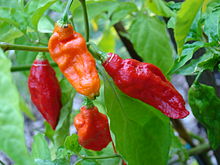Ghost pepper
| Bhut jolokia | |
|---|---|
 |
|
| Hybrid parentage | C. chinense × C. frutescens |
| Origin | Assam, India |
| Heat |
|
| Scoville scale | 1,041,427 SHU |
The Bhut jolokia (Assamese: ভূত-জলকীয়া, IPA: [ˈbʱʊt.zɔˌlɔkiˌja]), also known as ghost pepper, ghost chili, U-morok, red naga, naga jolokia and ghost jolokia, is an interspecific hybrid chili pepper cultivated in the Indian states of Arunachal Pradesh, Assam, Nagaland and Manipur. It is a hybrid of Capsicum chinense and Capsicum frutescens and is closely related to the Naga morich of Bangladesh.
In 2007, Guinness World Records certified that the Ghost pepper was the world's hottest chili pepper, 400 times hotter than Tabasco sauce. The Ghost chili is rated at more than 1 million Scoville heat units (SHUs). However, the ghost chili was shortly superseded by the Infinity chili in 2011, followed by the Naga Viper, the Trinidad moruga scorpion in 2012, and the Carolina Reaper on August 7, 2013.
The chili is referred differently in different regions. In Assam, it is widely known as bhût zôlôkiya (ভুত জলকীয়া) or bih zôlôkiya. In some parts of Assam, this chili is called naga zôlôkiya (নগা জলকীয়া), believed to be named after the ferocious Naga warriors inhabiting the plains and hills of Nagaland. Further complicating matters, a 2009 paper coined the English term "Naga king chili" which refers to the chili's large pod size. This is probably because the chili has long been colloquially known as Raja mircha or Raja mirchi in Nagaland. It also stated that the most common Indian (Assamese) usage is bhût zôlôkiya (ভূত জলকীয়া) and gives the alternate common name as bih zôlôkiya (বিহ জলকীয়া, bih means "poison" in Assamese, denoting the plant's heat). The Assamese word zôlôkiya simply means the Capsicum pepper. Other usages on the subcontinent are saga jlokia, Indian mystery chili, and Indian rough chili (after the chili's rough skin). It has also been called the Tezpur chili after the Assamese city of Tezpur. In Manipur, the chili is called umorok or oo-morok (oo = "tree", morok = "chili"). The Kukis called it "Malcha-Phoh" meaning "the most pungent chilli".
...
Wikipedia
